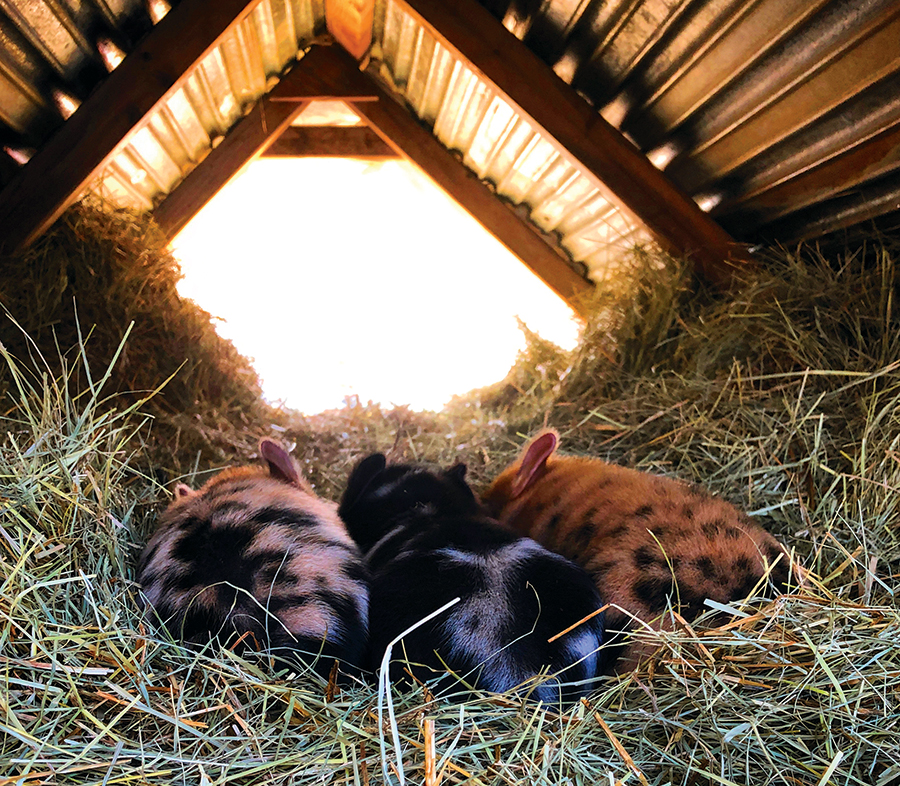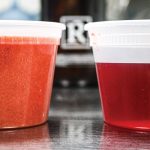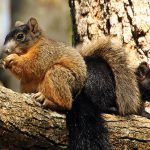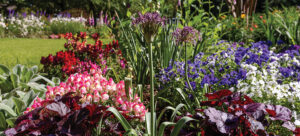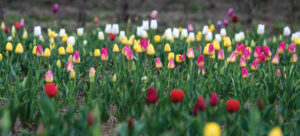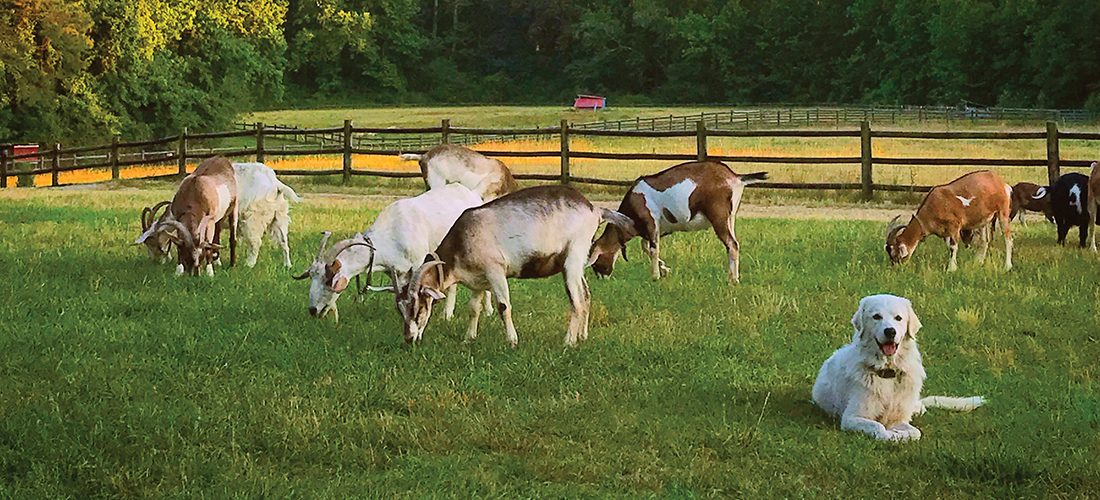
In the fast lane at Slow Farm
By Claudia Watson
A chain saw-wielding woman wearing bold red lipstick might be the last thing you’d expect to see on a farm, but at Slow Farm, the untraditional is just everyday life.
“We break rules,” says farmer and co-owner Rachel Herrick, during a break from cutting a fallen oak destined for a grow-your-own mushroom workshop. “But there are some rules of farming that need to get broken.”
Farming has been in Herrick’s family for generations. She grew up on her family’s farm in Maine, where they raised cattle, hogs and poultry, and grew a market garden and orchard.
“All of it was done pretty old-school style,” she recalls. “Hogs in pens, chemical fertilizers and pesticides. Those methods are not our methods.”
Like many people who grew up farming, Herrick was encouraged by her family to get an education and get off the farm. Farming was a financial dead end, and backbreaking to boot. “I loved the life, but it’s not easy or especially kind to farmers.”
Her education took her into the arts. While she was working on her master’s degree in contemporary art, farming remained at the forefront of her mind, and she struggled to try to create art that genuinely interpreted both her love and sadness for the declining American farm.
“I cared about food, animal welfare, pollution, land degradation and the loss of the American farmer,” she says. “Eventually, I realized it was nuts for me to make art about this when the best way for me to cause the kind of change I cared about was to go back and farm.”
As Herrick and her husband, Carl, waited for their perfect property to pop up in real estate listings, they researched sustainable farming, land regeneration, ethical farming, heritage farming and historical farming methods.
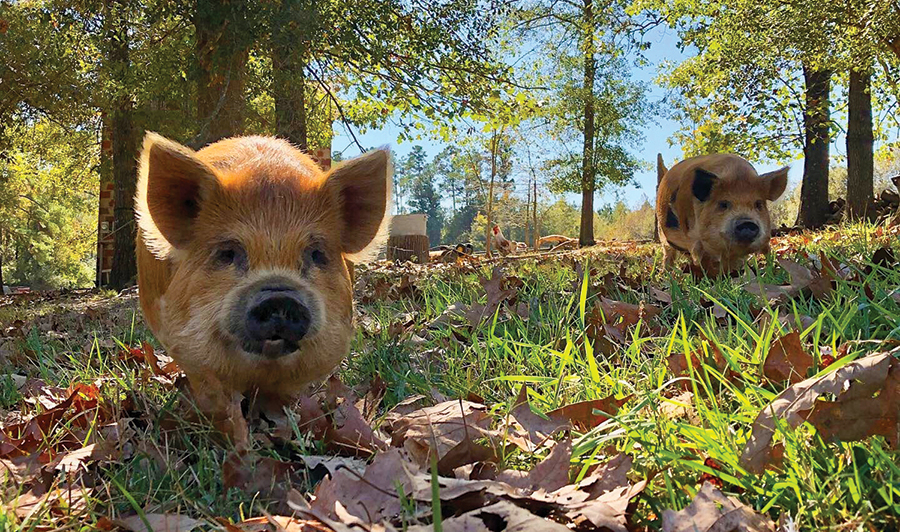
“I knew I wanted to do things differently from how I grew up doing them — to learn from the missteps of my predecessors while honoring them, too,” she explains. “We wanted a farm that was sustainable in every single sense of the word, and we wanted to go into this with our eyes open.”
They purchased their 47-acre Cameron farm in 2015. It had been in foreclosure for years, and the buildings were in pitiful condition. Still, Herrick says, “We knew this was our home about halfway up the driveway. It was beautiful, had a wonderful history, and loads of potential.”
Today, Slow Farm is a private regenerative farm that uses holistic and historic farming techniques to slowly restore a 150-year-old former tobacco farm to fertile, self-sustaining farmland. They are playing the long game through diversified rotational grazing, no-till over-seeding methods, and eliminating all use of herbicides, fungicides and chemical fertilizers.
“No chemicals, no short cuts. It’s the way nature does it,” she says. “The results are awesome and exciting, but incredibly slow, hence the farm’s name, but we’re good with that, too.”
The farm’s livestock — pigs, goats and a “flotilla” of poultry — play the most significant role in the project. Each species and breed were researched and matched to the land’s existing resources and deficits to bring the most benefits with as few inputs as possible.
They are especially excited about the regenerative potential of their breeding herd of Kunekune (“coo-nee, coo-nee”) pigs, a rare breed of docile, non-rooting, grazing pig from New Zealand.
“They are smaller, and their short little snouts are turned up just so for grazing,” she mimics with her upturned red lips. “They’re a perfect fit for sustainable farms, homesteads or as family companions. Easy on the land and their humans.”
Herrick says she was quickly impressed with how different Kunekunes are from the massive white pigs she grew up around. “I was an instant Kune convert,” she laughs.
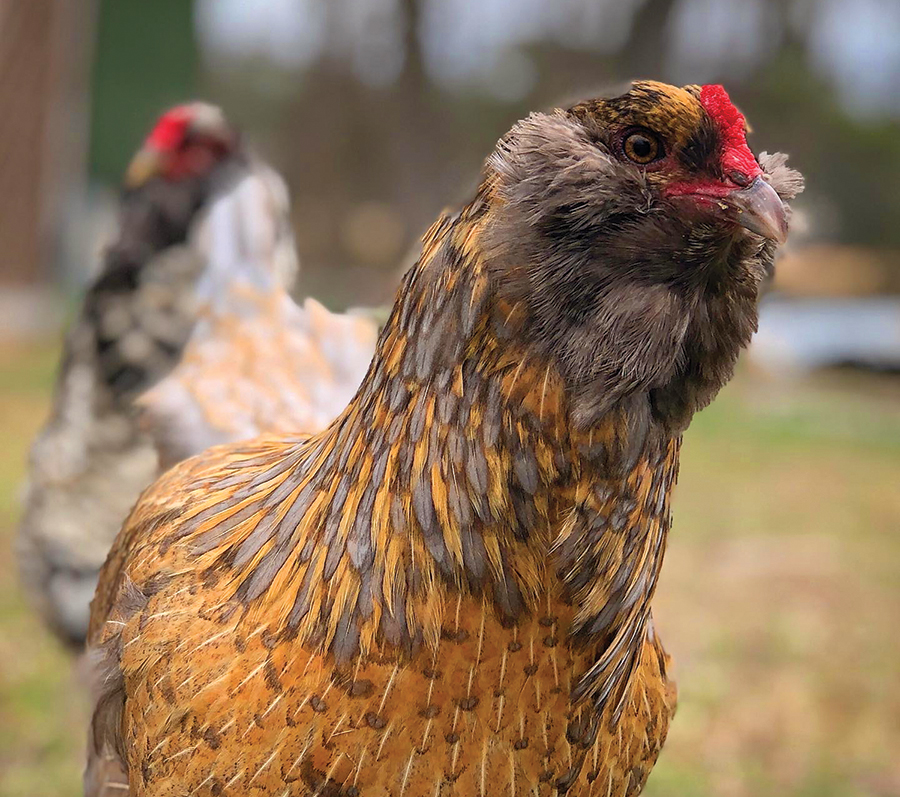
They knew within months that they needed to go “whole hog” on the Kunekunes. They invested in quality registered breeding stock so they could be part of conserving the rare breed, which nearly went extinct in the mid-’80s.
Currently, Slow Farm is home to 22 adult Kunekunes and hosts workshops for wannabe Kunekune owners. “It’s one of the benefits of purchasing a Slow Farm pig. You get me for lifetime tech support,” Herrick says with a wink. “There’s always a mentorship component with my pig customers. I really want folks to succeed.”
For the past decade, Herrick has worked at an arts organization doing communications, design and event planning — creative skills she uses now to offer a personal and often humorous look into Slow Farm life. But beyond the cute animals and fun portrayed on their social media, it’s all about science.
Along the farm’s long driveway, there are acres of open meadows and woodlands supporting an abundance of seen and unseen life. If it looks more like a nature preserve than a farm, it’s all part of the plan. “When we bought this place, there were areas of just open loose sand. Nothing would grow there at all. So to us, a field of broomsedge is a triumph,” she laughs.
About half of the farm currently supports the Kunekunes, brush goats, poultry and gardens. The remaining acreage is mowed and seeded as pollinator fields, part of a slow process of creating topsoil and reviving the land to the point where it can function as pasture for future herds of sheep and cattle. This past year, they planted a variety of berry and nut trees and an orchard of local heritage apples, as they plan for a future of apple harvests and cider pressings.
“With regenerative farming, you can only build your farming business as fast as the land can progress, which isn’t very fast,” she admits. “This means thinking outside the box about products and income sources.”
In starting fresh on their land, she and Carl — both experienced educators — integrated agritourism into the business plan, recommitting themselves to educating and connecting with their community. In 2019, Slow Farm was awarded an AgPrime grant by the University of Mount Olive in a project sponsored by the North Carolina Tobacco Fund Trust Committee. That funding, as well as income generated through T-shirt sales and donations, allowed them to renovate the barn and build visitation areas for the public to interact with the pigs.
“Their support made it possible for us to have more people safely enjoy our farm,” says Herrick. Twenty-six workshops were scheduled for this year, covering topics ranging from growing your own mushrooms and greens, to building pollinator hotels, birdhouses and bat boxes, to painting decorative barn quilts based on historical textiles. But the workshop schedule, among other activities on the farm, was thrown into disarray with COVID-19.
The pandemic devastated the farm’s income, which is mainly dependent upon the sale of eggs to restaurants, workshops, and the breeding and sale of Kunekunes.
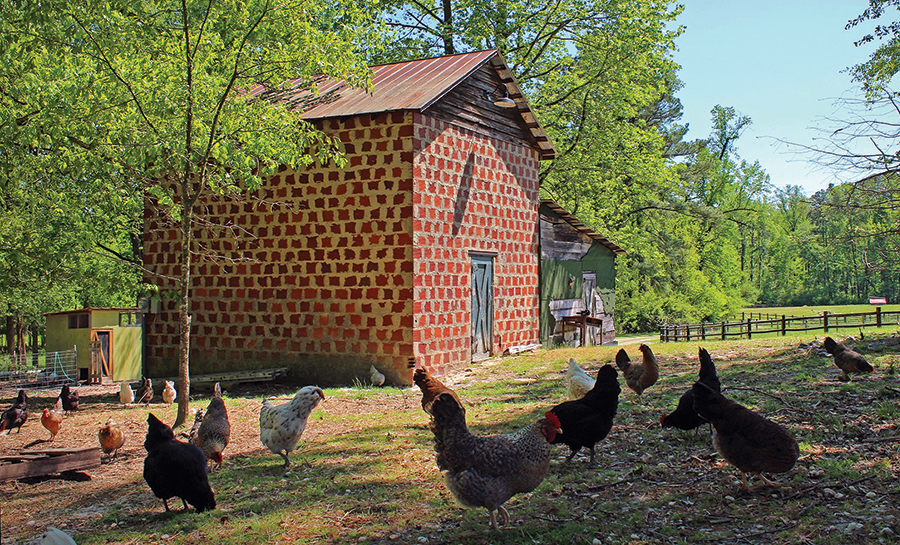
“We saw this coming and elected to put the brakes on the workshops and the breeding,” Herrick says, noting that the shifts in markets made them modify their business model. Still, it also gave them time to consider and plan expansion.
“We supplied restaurants with fresh eggs, but they’re not buying them now, or cutting back. We had a couple of weeks when we thought, ‘Oh, man, what are we going to do with all these eggs?’ When we announced the egg availability on our social media network, it was swoosh — they’re going, going fast!”
Herrick says direct sales to consumers have entirely erased the slack in the restaurant sales. Now, egg consumers come to the farm by appointment.
“We encourage them to take their time and look around, but not get out of their cars,” says Herrick. “Enjoy a slow drive up the driveway to the egg stand and watch our mini-safari of goats, pigs and poultry in our pastures.”
The couple also planted 600 asparagus seedlings, which offers them an additional product for direct sales or restaurant sales in future years.
Herrick reassures the workshops will go on, with some shuffling of the schedule, when the time is appropriate.
“We’re going to wait until we get the OK, then we’ll most likely do morning workshops to avoid the heat,” she says. The renovated barn, the site of the workshops, can comfortably accommodate each guest working at a separate table, to ensure the appropriate social distancing. “We’re putting an extra focus on helping and maintaining the community’s curiosity and interest in self-sufficiency with workshops that focus on gardening, backyard chicken keeping and the Kunekunes,” she says.
Each workshop combines farming with creativity in a way Herrick hopes people will find fun and empowering. “We offer unique hands-on opportunities to connect with nature, science, and the creative thinking that drives regenerative farming,” she explains. “Those experiences allow visitors to appreciate their power and relationships with farming.”
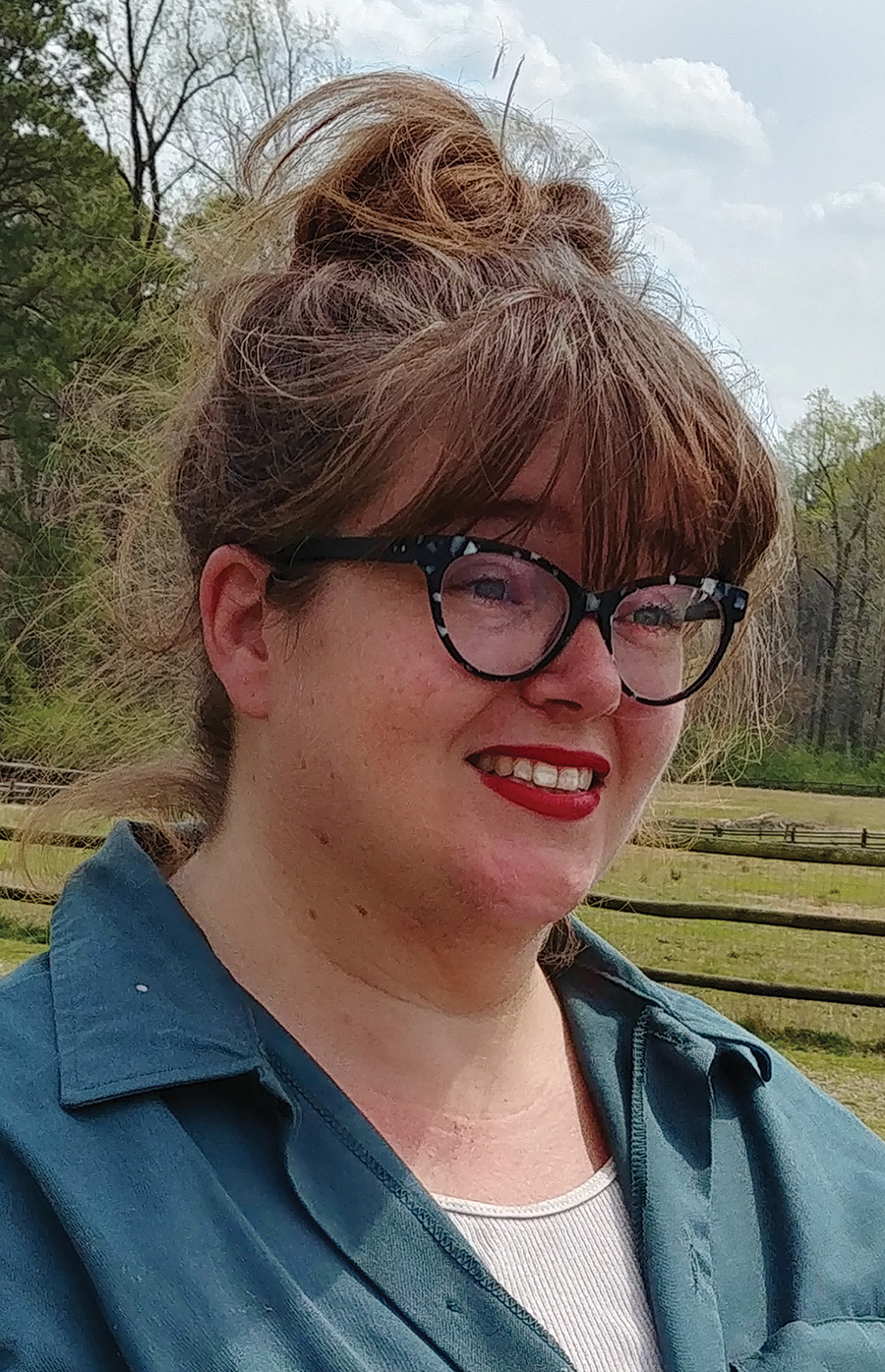
Slow Farm is not open for drop-in visits, although private tours can be arranged. Public farm days are held twice a year. In early November, the farm offers a lively Piggy Pumpkin Palooza, an event that welcomes visitors to retire their Jack-o’-lanterns by chucking them to the pigs. The farm was to be featured on this year’s Sandhills Farm Tour, but the tour was rescheduled to April 24, 2021, due to the coronavirus pandemic. A full schedule of workshop opportunities is listed on the farm’s website: http://www.slowfarmnc.com (classes fill quickly).
Slow Farm’s owners pursue their more abundant life with far less monetary compensation. Carl works off-farm, and Herrick, who runs all things “farm,” does freelance design and writing projects as time permits to stabilize the income stream. “Whatever it takes,” she admits. “You get creative when you’re flying without a net.”
She yanks the chain saw’s starter and eyes another log. “Farming in red lipstick is not a normal thing, but it makes every day farming fun. I don’t know anyone who doesn’t feel empowered when they’re rocking some red lipstick.” PS
Claudia Watson is a contributing writer to PineStraw and The Pilot and can usually be found in a garden.
